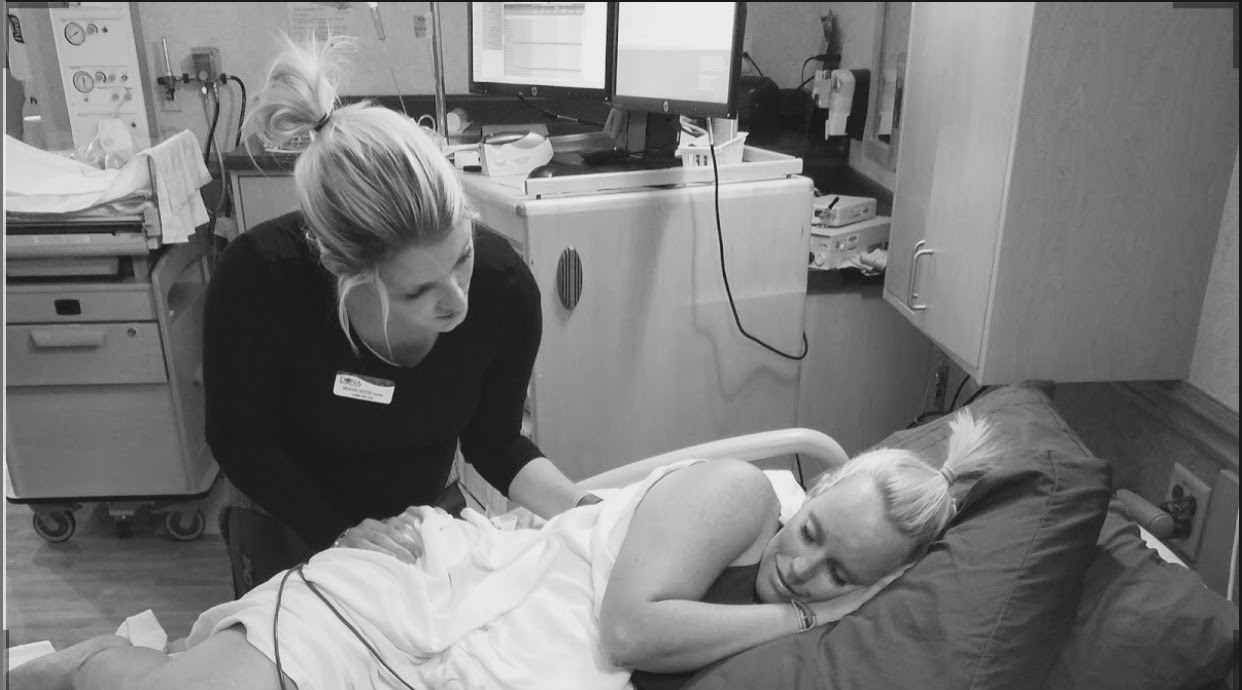
What does it mean to have a failed VBAC, and how do you cope with having an unplanned C-section when it’s not what you wanted?
I prefer not to use the word “failed VBAC.” However, this is how most medical professionals will label a birth that ended in a repeat C-section after planning for a vaginal birth. It is often called a TOLAC (Trial of labor after Cesarean).
I encourage you to look past the word “failed” when it comes to birth and know that you did not fail at anything. You are a woman of strength and should be proud of yourself.
Not everyone would describe their Cesarean as traumatic, but it often can be experienced that way. Feeling sad, mad, confused, afraid, and even depressed after going for a VBAC and having it “fail”, leaving you back in the operating room, is okay.
In this article, I want to talk about how to get past the word “failed” and handle the disappointment of birth not going as you had hoped.
My “failed” VBAC story
I remember being in labor with my second daughter and wanting to VBAC. I was ready, and I felt like I had done everything to prepare for a successful VBAC.
I couldn’t wait to take on this birth and rock my VBAC.
I’ll never forget the moment I sat down on my cousin’s couch and felt a ton of water come out in my pants. I told her, “Well, either my water just broke or I totally peed on your couch.”
After 18 hours of hardly contracting and begging for Pitocin to help jump start my labor, I was told there is no way I could have this baby vaginally. I asked for another hour.
I remember the exact moment he said that my body had stopped contracting — I felt total defeat.
Contractions never really picked back up. My provider diagnosed failure to progress. Because my water had been broken for a while, I would need to head down to the OR. Sadly, I didn’t have a doula, and my husband was pushed into a corner with fear. I found myself walking down to the OR in tears, the nurse behind me squeezing an IV bag to get the fluid into me as fast as she could.
I got a spinal, and remember lying down, looking up at the ceiling tiles. I felt numb, inside and out, and like a total failure in so many ways. I was heartbroken. However, I told myself I needed to be okay with what was happening and to “suck it up.”
After my daughter was born, I was happy to have her there, but I felt broken inside.
I had “failed”, my body had “failed”, and I was embarrassed to even post in the VBAC group I was part of. I had longed for the moment I could write in that group with an I DID IT pic, and I didn’t want to let them know I had a “failed VBAC”.
I felt like I needed to process what had just happened, and hearing hospital staff call me a “failed VBAC” didn’t help. It took months and months of going through that day over and over again before I recognized the truth:
I was a strong birthing parent who went through a very serious surgery to get my daughter here. I am a woman of strength, and I did not fail. In fact, I now believe that I was failed by a system that is not always supportive or empowering to birthing parents.
It wasn’t until years later, as I started preparing for my VBA2C, that I realized how much trauma I held from that experience.
Processing traumatic birth experiences
Many situations that come up during labor and birth, including having an unplanned repeat C-section, can leave you feeling a range of painful emotions — from regret and disappointment, all the way up to PTSD.
I encourage you to work through any past experiences that bring on fear, trauma, or doubt about any upcoming births. Talking about your past experiences with someone who is supportive of your decisions is important.
Think of two or three people who you can include in your safe space. Keep those people near and turn to them when you need to vent, ask questions, or get suggestions.
It’s always important to be kind to yourself and get the help you need to heal from birth trauma, and even more so when you are planning for another birth. If you don’t process your previous birth experiences, especially if there was trauma, those feelings may come up in the next birth, causing potential problems.
Be mindful that if your birth partner has experienced trauma or has fears surrounding birth, it’s also important for them to work through things before entering the next birthing space.
Our minds are powerful. Negative emotions, like fear and anxiety, have the ability to cause labor to stall or not progress as it normally would.
In a paper titled Previous Traumatic Birth, researchers found that negative birth experiences also have a big impact on future birth choices:
“A significant number of mothers who initially requested a cesarean section for psychosocial reasons chose a vaginal birth after counseling or short-term psychotherapy.”
Previous Traumatic Birth: An Impetus for Requested Cesarean Birth
Patti Spiegelberg Gardner, CNM, MSN
In my doula practice, I worked with a client who had experienced a traumatic vaginal birth. Due to that experience, she was very scared to ever try for a vaginal birth again. With amazing counseling and some PT pelvic floor therapy she was able to work through the physical and emotional trauma. She went on to have an empowering vaginal birth that she said changed her life forever.
Recognizing where the trauma comes from is a great first step in beginning to heal. It is a good idea to start with some simple questions:
- What was it about your birth that brought fear?
- How can you now eliminate that fear?
- Were you spoken to poorly?
- Did you have vaginal tearing or other trauma physically?
- Were things happening around you without you being involved in decisions?
- Did you feel in control, or out of control?
Birth trauma may not always be something that sticks with mothers in a negative way, but if it does, it is important to be able to work through it prior to the arrival of your next baby.
Break down all of the things that bring trauma and process them one by one.
Once you break down your feelings about your previous births, give yourself some serious credit. It is so important to recognize that you are amazing and to be proud of where you have come.
Something I did after processing my births was to recognize that I wasn’t a failure — I was a strong woman and mom.
Please, please, please don’t ever feel like a failure. Women, you are AMAZING and we are so proud of you. We hope that through your journey, you are able to heal through your birth experiences.
Ways to Cope After Unsuccessful VBAC Attempt
It is normal to not want to cope or even think about an experience that you didn’t love. And when it comes to birth, coping with what may have brought fear, trauma, or even anger may not be something you choose to deal with right away. You may not even know how to cope with it at all.
When you’re ready, these tips on coping after an unsuccessful, aka “failed VBAC”, can help you begin to heal.
1. Understand that no matter what happens, you are strong.
Following your intuition and being at peace with your decision will help with recovery. It is 100% okay to mourn the loss of your experience while also being happy and celebrating the birth of your baby.
2. Take charge of your own birth.
If you are planning to have more children, learn everything you can about birth options, including gentle or family-centered cesarean.
With my second Cesarean, I knew the options I could have in the OR. I talked to the hospital staff prior to going to the OR and felt very supported with the things I desired.
These things included skin-to-skin contact, being able to watch my Cesarean, my provider speaking to me during the birth, music playing, my husband taking pictures, and overall being included and feeling part of my birth.
3. Understand that VBAMC may still be an option.
We have known many mamas, and one of our own podcast hosts, who have experienced vaginal birth after multiple cesareans. If you plan to have more children, you may still have options for VBAC, even after 3 c-sections. Knowing your options after you experience a repeat cesarean can help bring peace of mind along the way.
4. Find support.
Finding supportive people or a safe group where you can talk through your thoughts and feelings can truly be validating. I loved talking to the friends I had about my experience because they always made me feel much better.
Get inspired by reading VBAC birth stories, or listening to The VBAC Link podcast.














 Unmedicated Birth vs Epidural: How to Choose What’s Right for You
Unmedicated Birth vs Epidural: How to Choose What’s Right for You